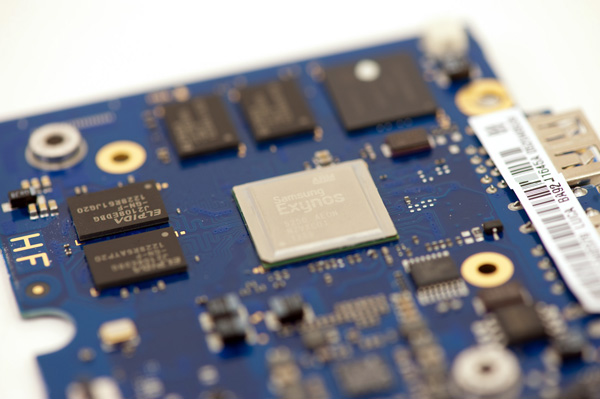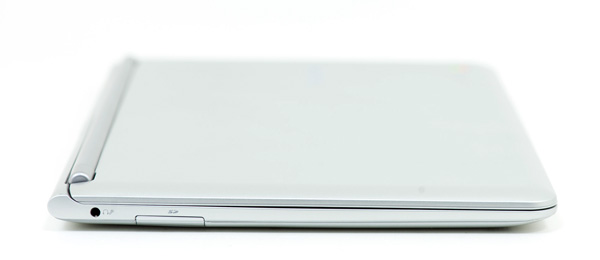Samsung Chromebook (XE303) Review: Testing ARM's Cortex A15
by Anand Lal Shimpi on October 31, 2012 9:00 AM ESTFinal Words
The move to ARM doesn't fundamentally change the performance or usability of the Chromebook. It's still a slow (relative to more expensive notebooks), limited use notebook. That's not necessarily a bad thing, but you need to be aware of what you're getting into with this thing.
The display is functional but not very good. Build quality is decent but the new Chromebook is still a plastic notebook. Thankfully the keyboard and trackpad are both pretty decent.
For a basic web browsing and glorified typewriter platform, the Chromebook really does get the job done. It's a very focused, simple device that serves its purpose well. I don't know how big the Chromebook niche is, but Google has targeted it very well. At $249 if you need a physical keyboard and only need basic web browsing support, I don't know that there's a better solution. As an almost-disposable notebook for writing and browsing the web, I'm happy with the Chromebook. Good ultraportables are much more expensive, and even low cost PCs don't come with any sort of solid state storage. Admittedly the eMMC solution in the Chromebook isn't setting any records, but it does deliver consistent IO performance which is more than I can say for a cheap 5400 RPM 2.5" hard drive.
Ultimately the Chromebook puts pressure on the traditional PC notebook ecosystem from below. Tablets have been doing that for a while but they are a physically different form factor. For those who still want a traditional notebook form factor, there hasn't been much low-cost competition. The Chromebook applies a good amount of pressure there. Compared to a $1000 notebook, the Chromebook's display isn't great but move down into the $500 - $700 range and it doesn't look all that bad thanks to many PC makers failing to invest in good quality panels. If a $249 Chromebook delivers a competitive keyboard, trackpad, display resolution and quality experience to your $499 PC notebook, it's time for a change. With Apple pushing at the top and Google working the bottom, the hope is that the entire PC notebook stack gets better.
On the SoC side, our first look at ARM's Cortex A15 is quite positive from a performance standpoint. I'm still not convinced on its power consumption for smartphone use (big.LITTLE must exist for a reason) but from a performance standpoint, it's going to make current smartphone/tablet SoCs feel very slow. And that's something we can all look forward to in 2013.












149 Comments
View All Comments
eddman - Thursday, November 1, 2012 - link
What your comment has to do with what I wrote?! I never mentioned anything about smartphones.I just pointed out that you cannot compare an old 45nm chip with a brand new 32nm one, consumption wise.
Then again, just because we haven't seen clover trail on smartphones, doesn't mean it consumes too much power.
Hulk - Wednesday, October 31, 2012 - link
Good quality IPS screen on my next laptop or I stay with my Dell 640m forever.Put a SSD in it recently and I'm totally fine with it.
slackpenguin - Wednesday, October 31, 2012 - link
I keep reading these comments on reviews for this device like "wouldn't some other device be a better value for $250?"How many of you actually go and buy $250 used clunker laptops and are overjoyed with the "value" you just picked up over a 2.5 lb, 0.8 inch, fanless laptop with a warranty?
I haven't seen $250 laptops that come with any "advantage" of a "proper OS". New $250 laptops almost always come with Windows 7 Starter. Used, almost always blank or Windows XP Home. They inevitably either weigh 6 lbs or run a dog slow Atom with 1GB RAM and a 4200 or 5400 rpm drive that is soundly beat by this new Exynos chip setup.
Granted, you can upgrade most any of these clumsy $250 devices talked about for another $40 as Microsoft is desperate for you to use tiles instead of a start menu.
It sounds like most of these comments are from people who would see value in the "Homer Car" over one of those Smart cars. There are plenty of devices out there for you people. This "value" comment is just getting annoyingly repetitive.
eddman - Wednesday, October 31, 2012 - link
You are right about the 250$ range, but with a little more you can get some good stuff.http://www.bestbuy.com/site/Asus+-+14%26%2334%3B+L...
http://www.bestbuy.com/site/Asus+-+15.6%26%2334%3B...
TrackSmart - Wednesday, October 31, 2012 - link
Anand,Why not add a few words comparing this to a standard netbook? $250 sounds like a unique price class, until you hop on Newegg and see that netbooks can be had for similar prices. Here's an 11.6" model for $278 that runs an AMD C60 CPU, 4GB RAM, and 320GB HDD: http://www.newegg.com/Product/Product.aspx?Item=N8...
Key questions worth addressing in the article:
1) Is the Chrome user-experience dramatically better than running Windows on a low-end processor? [Particularly the more efficient Windows 8 platform.]
2) Do the advantages of a lightweight operating system really outweigh the lack of versatility compared to a full-blown OS?
3) Many of us have purchased netbooks as replacements of our parents ancient laptops. Does this Chromebook do a better job than netbooks at meeting basic computing needs?
Krysto - Thursday, November 1, 2012 - link
Yes it is, and Windows 8 is not that much more efficient than Windows 7. Maybe 5% more efficient.TrackSmart - Thursday, November 1, 2012 - link
To clarify, this isn't a "yes" or "no" question that I wanted an answer to. The "answer" depends on your computing needs and what you can afford.I have my own general answers. For my purposes, the Chrome OS is too limited for what I want to do with a laptop-like device. The *concept* of a lightweight operating system that can run on low-end hardware is fantastic. However, the Chrome OS ecosystem is still lacking in features and software availability. Microsoft's RT operating system sounds like it is getting closer to this goal, at least if Anandtech's review is to be believed. We'll have to see if 3rd party software appears to round-out the ecosystem. And the price is still $600 if you want the keyboard cover, so out of this sub-$300 discussion.
On the other hand, a Windows-based netbook can run all of the software I need, but painfully slowly. It's the reason I don't own a netbook and chose to spend more than $300. But if $300 is all you have to spend, and you need something portable that runs all of your productivity software, an 11.6" netbook might be better for you than a Chromebook.
karasaj - Wednesday, October 31, 2012 - link
Does anybody notice that A15 pretty much beats the Z2760 from the Surface review hands down in every way?If only Surface RT had that. But then again that might say just as much about IE versus chrome.
alvinchim - Wednesday, October 31, 2012 - link
Anand: How fast does this boot up? Is it like a smartphone/tablet, instantaneous? Is it like an apple ssd/os, pretty quick? Or like a window 7 SSD watch the screens go by? Or like a windows xp/hd x 7 years old, you might as well sort the laundry, text your girlfriend, and brush your teeth boot? That's a big question, because this really is like a tablet with a keyboard and a bad screen.slackpenguin - Wednesday, October 31, 2012 - link
I keep seeing figures of 10 seconds cold boot, 2 seconds from sleep mode, and 3 seconds off.